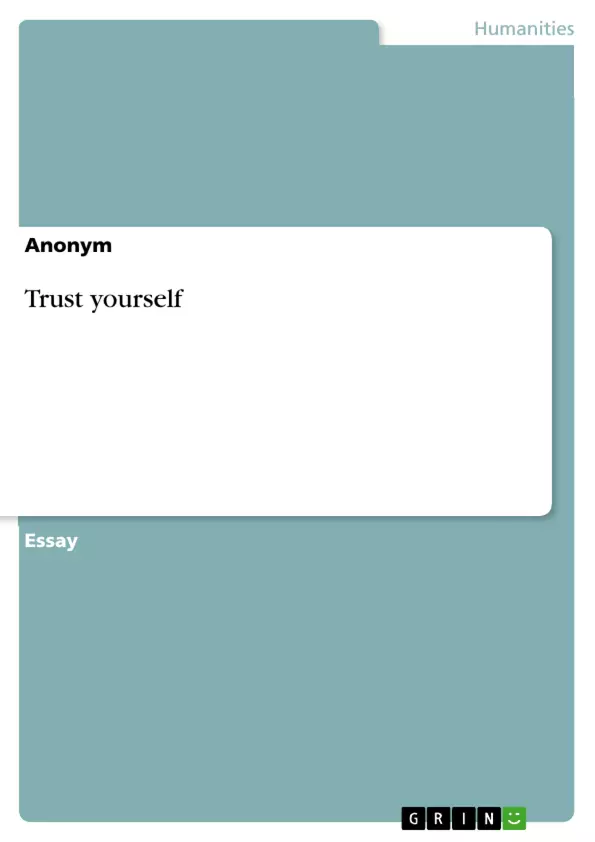In theory of the social sciences, trust has many definitions that vary a lot. Self-Trust is one of them. As research suggests self-trust can be understood for itself but is also an integral part of trust in general. Most simple it can be defined as “[…] trust that is directed at the self […]” to build a “[…] representation of the self [which is] able to cope with the world and itself. Trusting yourself is a very deep trust if not the deepest one can achieve. It means accepting your weaknesses and loving your strengths. In this Essay, a quote by Golda Meir is related to research about self-trust.
Table of Contents
- Introduction
- Golda Meir's Quote and Self-Trust
- Theoretical Perspectives on Trust
- Self-Trust: Self-Respect, Self-Esteem, and Self-Confidence
- Conclusion
Objectives and Key Themes
This essay explores the concept of self-trust, drawing inspiration from a quote by Golda Meir. It aims to analyze the meaning of self-trust, examine different theoretical perspectives on trust, and explore the interconnectedness of self-trust with self-respect, self-esteem, and self-confidence.
- The meaning and significance of self-trust
- Different theoretical perspectives on trust (economic and psychological)
- The relationship between self-trust and self-respect
- The relationship between self-trust and self-esteem
- The relationship between self-trust and self-confidence
Chapter Summaries
Introduction: This introductory section sets the stage by presenting a quote from Golda Meir emphasizing the importance of self-trust and using it as a springboard to explore the multifaceted concept of self-trust. It briefly introduces the essay's objective: to delve into the nature of self-trust, drawing upon various theoretical perspectives and examining its connections to related concepts like self-respect, self-esteem, and self-confidence.
Golda Meir's Quote and Self-Trust: This section provides an in-depth analysis of Golda Meir's quote, interpreting its core message as a call to cultivate self-belief and inner strength. The author connects the quote to the development of self-trust, highlighting self-acceptance, the ability to make sound judgments, and the significance of perseverance despite setbacks. This analysis positions self-trust as a crucial component of personal growth and achievement.
Theoretical Perspectives on Trust: This section explores diverse theoretical viewpoints on trust, comparing and contrasting neoclassical economic perspectives (which emphasize material benefits and reciprocity) with psychological perspectives (which highlight vulnerability and positive intentions). The distinction is made between interpersonal trust and self-trust, with the latter defined as trust directed toward oneself, enabling an individual to navigate the world effectively and maintain self-respect. This serves as a crucial foundation for understanding the unique characteristics of self-trust.
Self-Trust: Self-Respect, Self-Esteem, and Self-Confidence: This section delves into the intricate relationship between self-trust and related concepts such as self-respect, self-esteem, and self-confidence. It defines self-respect as valuing oneself for one's inherent worth and capabilities, demonstrating how it empowers individuals to pursue goals effectively. Self-esteem is explored as a fundamental aspect of self-perception, influencing interactions and contributing significantly to overall happiness. Finally, the section connects self-confidence to the belief in one's ability to execute desired behaviors, showcasing its relevance to achievement and personal well-being. It skillfully weaves together research findings to illuminate the synergistic relationship between these concepts and their collective contribution to self-trust.
Keywords
Self-trust, self-respect, self-esteem, self-confidence, trust, Golda Meir, neoclassical economics, psychology, personal growth, achievement, autonomy, self-efficacy, self-discrepancy.
Frequently Asked Questions: A Comprehensive Language Preview
What is the main topic of this essay?
The essay focuses on the concept of self-trust, exploring its meaning, theoretical underpinnings, and its relationship with self-respect, self-esteem, and self-confidence. It uses a quote by Golda Meir as a starting point for its analysis.
What are the key themes explored in the essay?
The key themes include the definition and significance of self-trust, different theoretical perspectives on trust (economic and psychological), and the interconnectedness of self-trust with self-respect, self-esteem, and self-confidence. The essay also analyzes a quote by Golda Meir to illustrate the importance of self-trust.
What theoretical perspectives are examined regarding trust?
The essay examines both neoclassical economic perspectives on trust (focusing on material benefits and reciprocity) and psychological perspectives (highlighting vulnerability and positive intentions). It differentiates between interpersonal trust and self-trust, emphasizing the latter's role in navigating the world and maintaining self-respect.
How does the essay define and relate self-trust to self-respect, self-esteem, and self-confidence?
The essay defines self-respect as valuing oneself, self-esteem as a fundamental aspect of self-perception, and self-confidence as the belief in one's abilities. It argues that these three concepts are intricately linked and contribute synergistically to overall self-trust. Self-trust, in turn, is presented as crucial for personal growth and achievement.
What is the significance of Golda Meir's quote in the essay?
Golda Meir's quote serves as the inspirational starting point for the essay. The essay analyzes the quote to highlight its message of self-belief, inner strength, self-acceptance, sound judgment, and perseverance as essential components of self-trust and personal success.
What are the main chapters of the essay?
The essay includes an Introduction, a chapter analyzing Golda Meir's quote, a chapter exploring theoretical perspectives on trust, a chapter focusing on the relationship between self-trust and related concepts (self-respect, self-esteem, and self-confidence), and a Conclusion.
What are the keywords associated with this essay?
Keywords include: Self-trust, self-respect, self-esteem, self-confidence, trust, Golda Meir, neoclassical economics, psychology, personal growth, achievement, autonomy, self-efficacy, and self-discrepancy.
What is the overall objective of the essay?
The essay aims to provide a comprehensive understanding of self-trust by analyzing its meaning, exploring relevant theoretical frameworks, and examining its connections to related concepts. It intends to show how self-trust is a crucial element of personal growth and achievement.
- Quote paper
- Anonym (Author), 2020, Trust yourself, Munich, GRIN Verlag, https://www.grin.com/document/1015118



